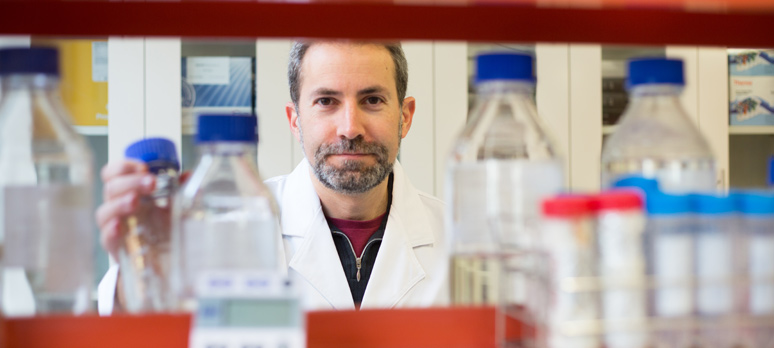Researcher Highlights
From Oxford to Newcastle
Dr Ian Grainge
The journey to biology research began for Dr Ian Grainge almost 20 years ago in the United Kingdom.

Two years into an undergraduate degree, Grainge's initial interest in Chemistry had begun to dwindle. He switched to genetics before obtaining his PhD in biochemistry and he hasn't looked back since.
From there he took his interest in research around the world. This included working on a natural yeast plasmid in Texas for three years before returning to work for Cancer Research UK, looking at replication proteins and protein structures (x-ray crystallography).
After doing more work on bacteria in Oxford, Grainge's idea was to link together biochemistry (how proteins work in test tubes) to the actual structural information and has carried on with this theme in his current research.
"At the moment we're trying to understand the molecular details of one of the motor proteins and the way it can bind and convert chemical energy into actual movement of DNA" explained Grainge.
"This FtsK protein is a very efficient molecular pump that moves the DNA through the cell and we're trying to understand the molecular details of how this protein machine works. It is found in most bacteria and plays an important role in the cell, co-ordinating the vital process of cell division and chromosome unlinking, which is one way bacteria keep their chromosome intact" he added.
The four year ARC Future Fellowship that Grainge was awarded in 2012 will contribute to this research, which could potentially form the basis for developing a new antibiotic to fight bacteria.
"It's amazing to get the grant both for opportunity for research and the recognition that somebody thinks my work is important. I've got more than enough work to do over the term of the Fellowship and I'll try to get students interested in the work as well to get them helping me on the project", said Grainge.
Mathematicians will also be involved with the project to try to understand the way in which the protein affects the shape of the DNA, known as DNA Topology, and how that affects the outcomes of these reactions.
Grainge's move to Newcastle 2010 was a big step to becoming independent and setting up his own lab, which was a big motivating factor in his decision making. Since his time at the University of Newcastle, he has obtained four grants, including the Fellowship, which is a major achievement.
While the future appears very busy for Grainge, he hopes to take up a few hobbies while based in Newcastle.
"I'd like to try surfing some day. I've just been too scared to try it so far. Apart from that I'm happy to stay at the University of Newcastle. I like it here," he said.
Related links
The University of Newcastle acknowledges the traditional custodians of the lands within our footprint areas: Awabakal, Darkinjung, Biripai, Worimi, Wonnarua, and Eora Nations. We also pay respect to the wisdom of our Elders past and present.
